Spring Cloud Alibaba version dependency
Add SpringBoot, SpringCloud and SpringCloudAlibaba version dependency integration, add core dependencies in dependency management, and add dependencies to be used in dependencies
Spring cloud Alibaba Version Description: https://github.com/alibaba/spring-cloud-alibaba/wiki/%E7%89%88%E6%9C%AC%E8%AF%B4%E6%98%8E
<parent>
<groupId>org.springframework.boot</groupId>
<artifactId>spring-boot-starter-parent</artifactId>
<version>2.3.2.RELEASE</version>
<relativePath/>
</parent>
<dependencyManagement>
<dependencies>
<!--integration spring cloud-->
<dependency>
<groupId>org.springframework.cloud</groupId>
<artifactId>spring-cloud-dependencies</artifactId>
<version>Hoxton.SR9</version>
<type>pom</type>
<scope>import</scope>
</dependency>
<!--integration spring cloud alibaba-->
<dependency>
<groupId>com.alibaba.cloud</groupId>
<artifactId>spring-cloud-alibaba-dependencies</artifactId>
<version>2.2.6.RELEASE</version>
<type>pom</type>
<scope>import</scope>
</dependency>
</dependencies>
</dependencyManagement>
Nacos overview
Nacos provides a set of easy-to-use feature sets, which can quickly realize dynamic service discovery, service configuration, service metadata and traffic management.
Nacos documentation: https://nacos.io/zh-cn/docs/quick-start.html
Nacos map
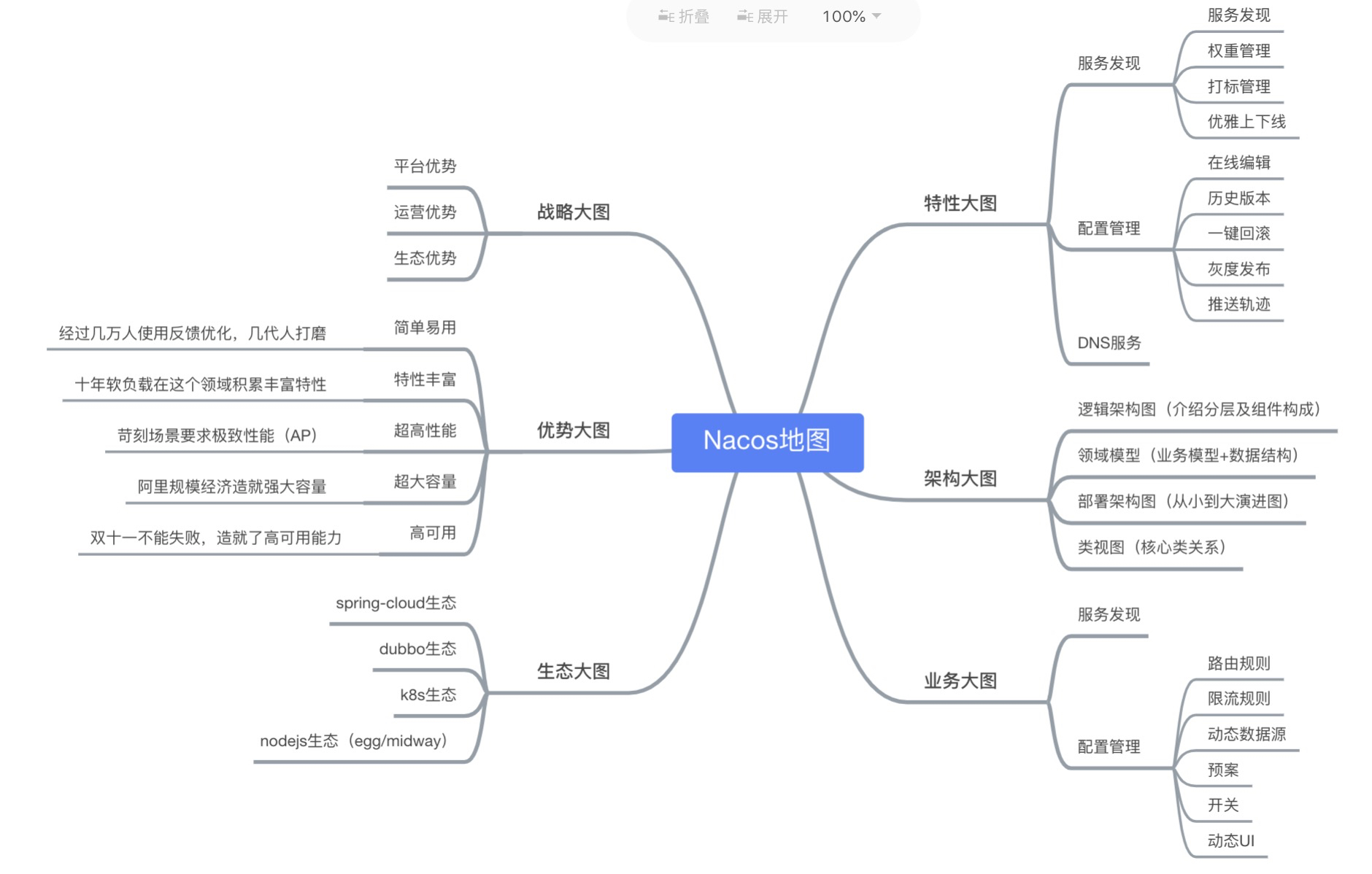
Nacos ecological map
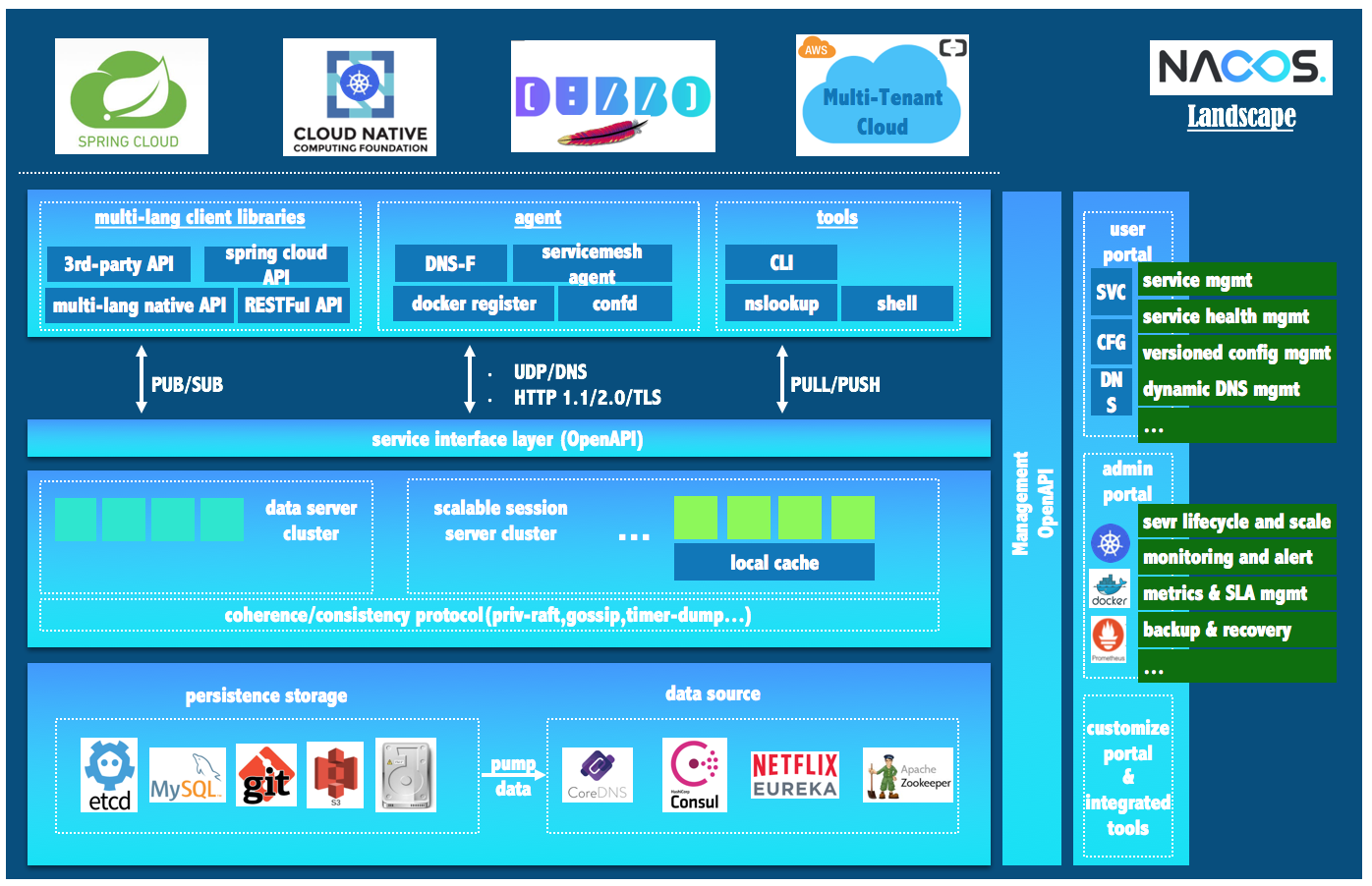
Nacos is used to simplify the solution of service discovery, configuration management, service governance and management, making the discovery, management, sharing and composition of micro services easier.
Build Nacos Server
To download Nacos, first determine the corresponding Nacos version of spring cloud Alibaba
<!--click artifactId get into spring-cloud-alibaba View in dependency management nacos Version of-->
<dependency>
<groupId>com.alibaba.cloud</groupId>
<artifactId>spring-cloud-alibaba-dependencies</artifactId>
<version>2.2.6.RELEASE</version>
<type>pom</type>
<scope>import</scope>
</dependency>
<nacos.client.version>1.4.2</nacos.client.version>
Nacos download the corresponding version: https://github.com/alibaba/nacos/releases
Windows
Start command (standalone stands for stand-alone mode, non cluster mode):
startup.cmd -m standalone
Shut down the server
shutdown.cmd
Docker deploys stand-alone Nacos
https://blog.csdn.net/qq_38628046/article/details/106875278
Service registration
Register user center service
Add dependency
<!--nacos client-->
<dependency>
<groupId>com.alibaba.cloud</groupId>
<artifactId>spring-cloud-starter-alibaba-nacos-discovery</artifactId>
</dependency>
Configuring nacos
spring:
application:
name: user-center
cloud:
nacos:
discovery:
# Specify the address of the nacos server
server-addr: IP:8848
# Specify a namespace, create a namespace through the Web interface of Nacos, and use the production or specified namespace ID to group similar services into different groups
# namespace: 54c13a17-6ef8-4f7d-8c4a-2f69ae06c13c
# ShangHai
# Specify the cluster name (e.g. divided by city and region)
cluster-name: ShangHai
# Metadata information
metadata:
instance: user
version: 0.0.1
Open service registration and discovery
@EnableDiscoveryClient Enable the service registration discovery function
@SpringBootApplication
@EnableDiscoveryClient
public class UserApplication {
public static void main(String[] args) {
SpringApplication.run(UserApplication.class, args);
}
}
Start service
INFO 10312 --- [ main] o.s.b.a.e.web.EndpointLinksResolver : Exposing 18 endpoint(s) beneath base path '/actuator' INFO 10312 --- [ main] o.s.b.w.embedded.tomcat.TomcatWebServer : Tomcat started on port(s): 8081 (http) with context path '' INFO 10312 --- [ main] c.a.c.n.registry.NacosServiceRegistry : nacos registry, DEFAULT_GROUP user-center 192.168.179.1:8081 register finished
Check whether the service is registered

using namespace std

Service details
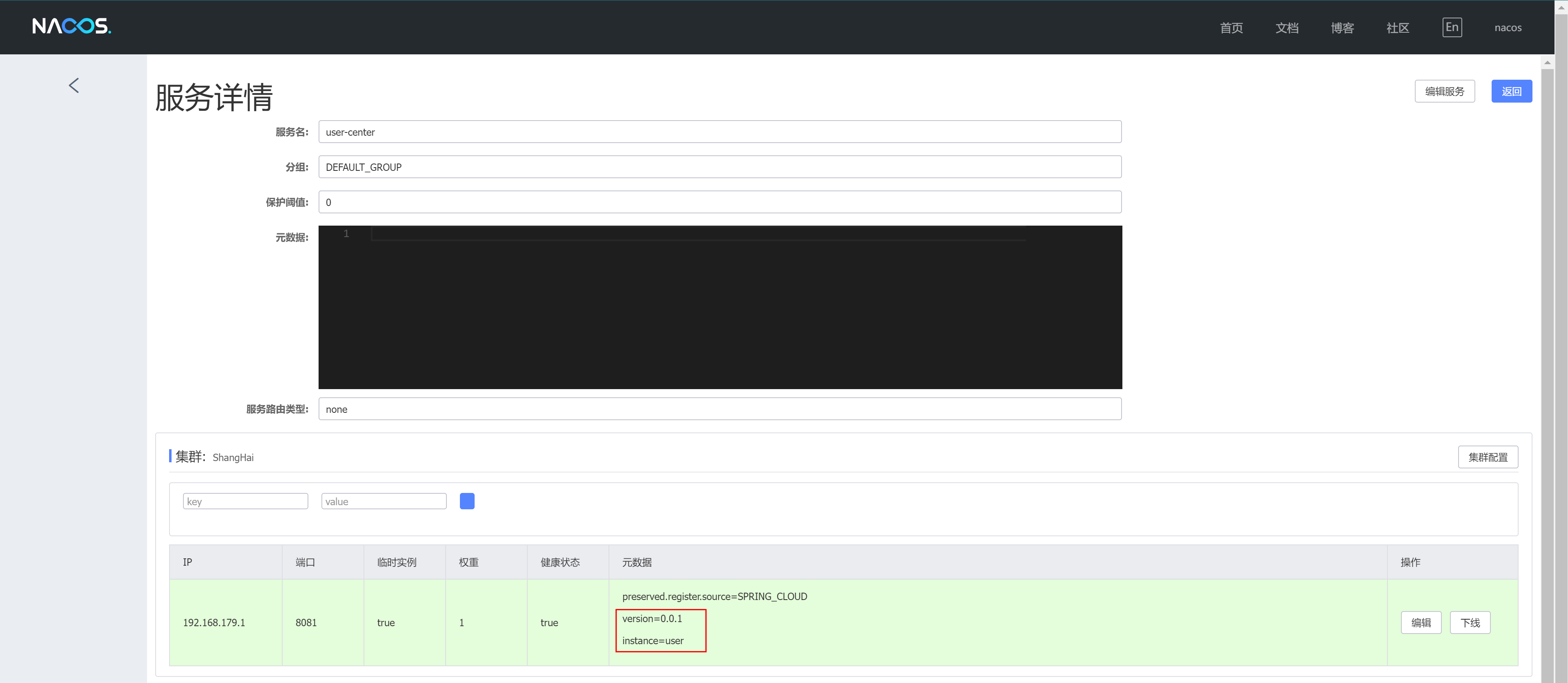
Register for pay Center Service
Add dependency
<!--nacos client-->
<dependency>
<groupId>com.alibaba.cloud</groupId>
<artifactId>spring-cloud-starter-alibaba-nacos-discovery</artifactId>
</dependency>
Configuring nacos
spring:
application:
name: pay-center
cloud:
nacos:
discovery:
server-addr: IP:8848
cluster-name: BeiJing
# namespace: 54c13a17-6ef8-4f7d-8c4a-2f69ae06c13c
metadata:
instance: pay
version: 0.0.1
Open service registration and discovery
@EnableDiscoveryClient Enable the service registration discovery function
@SpringBootApplication
@EnableDiscoveryClient
public class PayApplication {
public static void main(String[] args) {
SpringApplication.run(PayApplication.class, args);
}
}
start log
INFO 15440 --- [ main] o.s.b.a.e.web.EndpointLinksResolver : Exposing 19 endpoint(s) beneath base path '/actuator' INFO 15440 --- [ main] o.s.b.w.embedded.tomcat.TomcatWebServer : Tomcat started on port(s): 8082 (http) with context path '' INFO 15440 --- [ main] o.s.cloud.commons.util.InetUtils : Cannot determine local hostname INFO 15440 --- [ main] c.a.c.n.registry.NacosServiceRegistry : nacos registry, DEFAULT_GROUP pay-center 192.168.179.1:8082 register finished
Check whether the service is registered

Service details
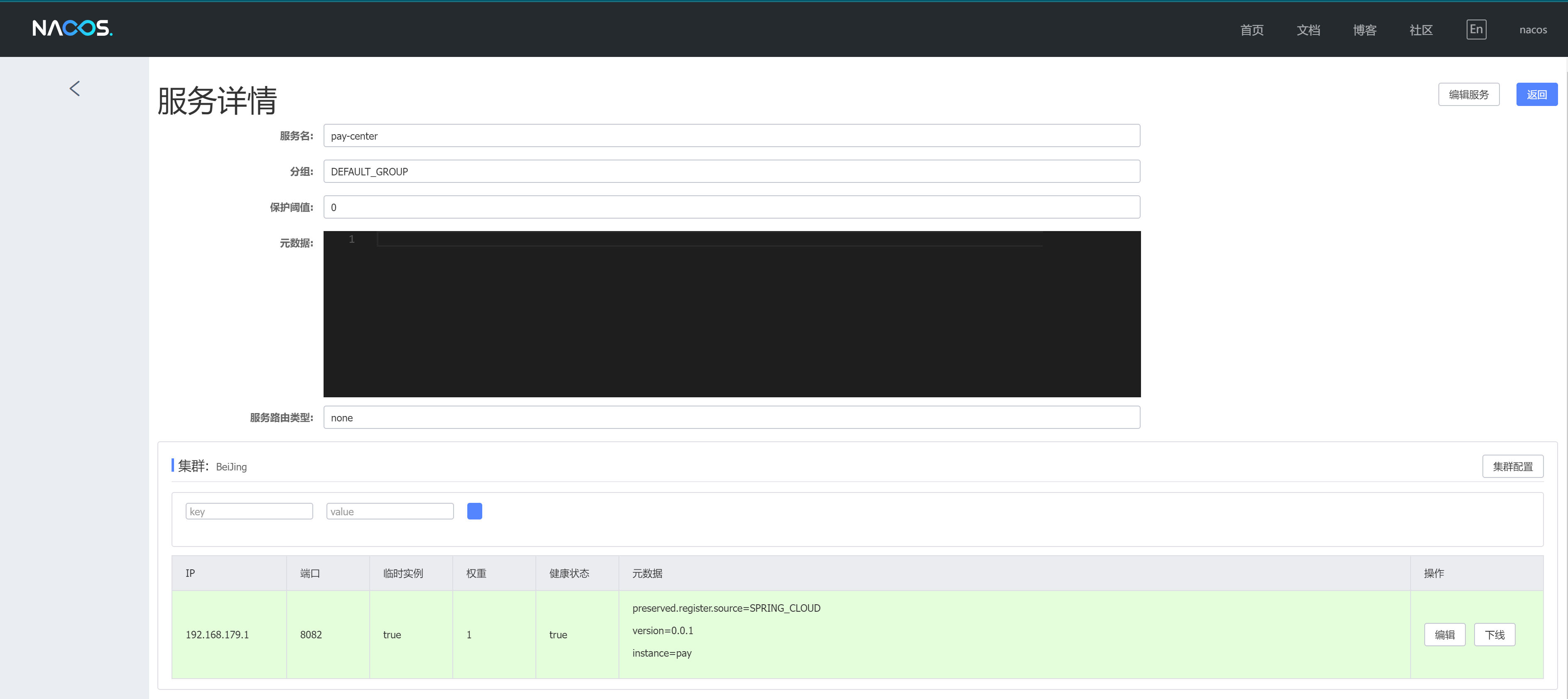
Service discovery
Add test interface
Add the test interface to the pay center service
@Slf4j
@RestController
public class TestController {
@Autowired
// DiscoveryClient is specifically responsible for service registration and discovery. It can obtain all services registered in the registry
private DiscoveryClient discoveryClient;
/**
* Service discovery: obtain the specified service instance from the service center
*
* @return Address information of all instances of user center
*/
@GetMapping("test")
public List<ServiceInstance> getInstances() {
// Query the information of all instances of the specified service
return this.discoveryClient.getInstances("user-center");
}
}
Perform test
Restart the project to access: http://192.168.179.1:8082/test
[
{
"serviceId": "user-center",
"host": "192.168.179.1",
"port": 8081,
"secure": false,
"metadata": {
"instance": "user",
"nacos.instanceId": "192.168.179.1#8081#ShangHai#DEFAULT_GROUP@@user-center",
"nacos.weight": "1.0",
"nacos.cluster": "ShangHai",
"nacos.ephemeral": "true",
"nacos.healthy": "true",
"preserved.register.source": "SPRING_CLOUD",
"version": "0.0.1"
},
"uri": "http://192.168.179.1:8081",
"scheme": null,
"instanceId": null
}
]
When the user center is stopped, obtain the service instance address
[]
After starting the user center service, modify the service port and start the second user center service
-Dserver.port=8083
start log
INFO 12292 --- [ main] o.s.b.a.e.web.EndpointLinksResolver : Exposing 18 endpoint(s) beneath base path '/actuator' INFO 12292 --- [ main] o.s.b.w.embedded.tomcat.TomcatWebServer : Tomcat started on port(s): 8083 (http) with context path '' INFO 12292 --- [ main] c.a.c.n.registry.NacosServiceRegistry : nacos registry, DEFAULT_GROUP user-center 192.168.179.1:8083 register finished
Check whether the service is registered

Service details
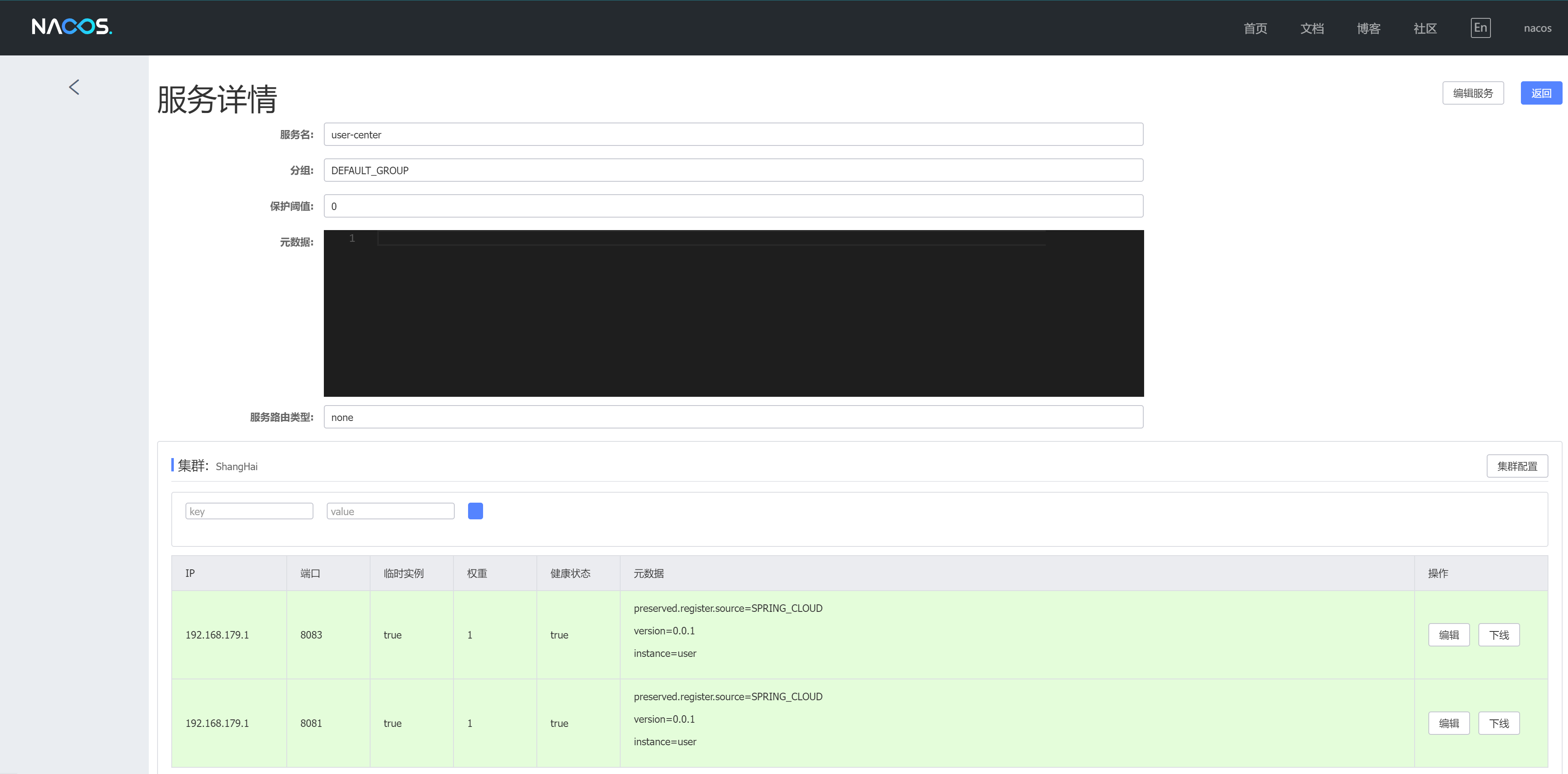
Then get the service instance address
[
{
"serviceId": "user-center",
"host": "192.168.179.1",
"port": 8083,
"secure": false,
"metadata": {
"instance": "user",
"nacos.instanceId": "192.168.179.1#8083#ShangHai#DEFAULT_GROUP@@user-center",
"nacos.weight": "1.0",
"nacos.cluster": "ShangHai",
"nacos.ephemeral": "true",
"nacos.healthy": "true",
"preserved.register.source": "SPRING_CLOUD",
"version": "0.0.1"
},
"uri": "http://192.168.179.1:8083",
"scheme": null,
"instanceId": null
},
{
"serviceId": "user-center",
"host": "192.168.179.1",
"port": 8081,
"secure": false,
"metadata": {
"instance": "user",
"nacos.instanceId": "192.168.179.1#8081#ShangHai#DEFAULT_GROUP@@user-center",
"nacos.weight": "1.0",
"nacos.cluster": "ShangHai",
"nacos.ephemeral": "true",
"nacos.healthy": "true",
"preserved.register.source": "SPRING_CLOUD",
"version": "0.0.1"
},
"uri": "http://192.168.179.1:8081",
"scheme": null,
"instanceId": null
}
]
Service call
Provision of services
Providing services in user center services
@RestController
@RequestMapping("/users")
@Slf4j
public class UserController {
private final UserService userService;
@GetMapping("/selectUserById/{id}")
@CheckLogin
public User selectUserById(@PathVariable Integer id) {
return this.userService.findById(id);
}
}
Consumer services
Create RestTemplate
@Bean
public RestTemplate getRestTemplate() {
return new RestTemplate();
}
Add calling service in pay Center Service
@Slf4j
@RestController
public class TestController {
@Autowired
private RestTemplate restTemplate;
@Autowired
// DiscoveryClient is specifically responsible for service registration and discovery. It can obtain all services registered in the registry
private DiscoveryClient discoveryClient;
/**
* Service discovery: obtain the specified service instance from the service center
*
* @return Address information of all instances of user center
*/
@GetMapping("test")
public List<ServiceInstance> getInstances() {
// Query the information of all instances of the specified service
return this.discoveryClient.getInstances("user-center");
}
@GetMapping("test/{id}")
public UserDTO selectUserById(@PathVariable Integer id) {
List<ServiceInstance> instances = this.discoveryClient.getInstances("user-center");
// Load balancing
// int index = new Random().nextInt(instances.size());
// ServiceInstance serviceInstance = instances.get(index);
String instanceUrl = instances.stream().map(instance -> instance.getUri().toString() + "/users/selectUserById/{id}")
.findFirst().orElseThrow(() -> new IllegalArgumentException("obtain user-center Instance failed,There are no related instances"));
return this.restTemplate.getForObject(instanceUrl, UserDTO.class,id);
}
}
Perform test
visit http://192.168.179.1:8082/test/1
{
"userName": "Xiaobai",
"age": 20,
"sex": "male",
}
Nacos Config configuration center
Using nacos as the configuration center is to treat nacos as a server, each micro service as a client, store the configuration files of each micro service on nacos, and then pull the configuration from nacos.
Add dependency
<dependency>
<groupId>com.alibaba.cloud</groupId>
<artifactId>spring-cloud-starter-alibaba-nacos-config</artifactId>
</dependency>
Create a bootstrap yml
Add the configuration of nacos config in the microservice. You cannot use the original application Instead of using YML as the configuration file, create a new bootstrap YML as configuration file
Profile priority (high to low)
bootstrap.properties -> bootstrap.yml -> application.properties -> application.yml
spring:
cloud:
nacos:
config:
server-addr: IP:8848
file-extension: yaml # Configuration file format
application:
name: nacos-config-center
profiles:
active: dev # Environmental identification
Nacos console new configuration
The contract is greater than the configuration, which needs to be consistent with bootstrap The configuration information in the YML configuration file is consistent
The Data ID is combined according to the configuration information of the configuration file: nacos-config-center-dev.yaml

Perform test
Add test interface
@RestController
public class TestController {
@Value("${my.nacosConfig}")
private String nacosConfig;
@GetMapping("/testNacosConfig")
public String testNacosConfig() {
return nacosConfig;
}
}
The test gets the configuration from the configuration center

Configure dynamic refresh
If the configuration is modified, the program cannot read the latest configuration. The configuration can be automatically updated through the Spring Cloud native annotation @ RefreshScope.
@RestController
// Enable the configured dynamic refresh function
@RefreshScope
public class TestController {
@Value("${my.nacosConfig}")
private String nacosConfig;
@GetMapping("/testNacosConfig")
public String testNacosConfig() {
return nacosConfig;
}
}
The test configuration is refreshed dynamically, and the Nacos configuration information is updated before accessing
my: nacosConfig: nacos-server-config-update

Configure sharing
When there are more and more configurations, you will find that many configurations are repeated. Therefore, you can consider extracting the public configuration file for sharing
Shared configuration between different environments of the same service
Create to spring application. Name, and then put the public configuration of all environments in it
spring:
datasource:
driver-class-name: com.mysql.jdbc.Driver
username: root
password: 123456
url: jdbc:mysql://IP:3306/demo?useUnicode=true&characterEncoding=utf-8&useSSL=false&serverTimezone=UTC

Create a name to spring application. The configuration named name dev stores the configuration of the development environment
my: nacosConfig: dev

Create a name to spring application. The configuration named name test stores the configuration of the test environment
my: nacosConfig: test

Configure bootstrap yml
spring:
cloud:
nacos:
config:
server-addr: IP:8848
file-extension: yaml # Configuration file format
namespace: 87a4700f-1dc1-430c-8a99-de98d9e8c55a
group: TEST_GROUP
application:
name: nacos-config-center
profiles:
active: dev # Environmental identification
Start project
INFO 55156 --- [ restartedMain] b.c.PropertySourceBootstrapConfiguration : Located property source: [BootstrapPropertySource {name='bootstrapProperties-nacos-config-center-dev.yaml,TEST_GROUP'}, BootstrapPropertySource {name='bootstrapProperties-nacos-config-center.yaml,TEST_GROUP'}, BootstrapPropertySource {name='bootstrapProperties-nacos-config-center,TEST_GROUP'}]
INFO 55156 --- [ restartedMain] cn.ybzy.demo.Application : The following profiles are active: dev
Perform test
@RestController
@RefreshScope
public class TestController {
@Value("${my.nacosConfig}")
private String nacosConfig;
@GetMapping("/testNacosConfig")
public String testNacosConfig() {
return nacosConfig;
}
}

Shared configuration between different services
Define a public configuration and then import it into the configuration files of different microservices.
Create a new configuration file in nacos and define a data ID of service common Yaml configuration for all microservices sharing
spring:
datasource:
driver-class-name: com.mysql.jdbc.Driver
username: root
password: 123456
url: jdbc:mysql://IP:3306/demo?useUnicode=true&characterEncoding=utf-8&useSSL=false&serverTimezone=UTC

Modify spring application. Name named profile
my: serverName: nacos-config server: port: 7777

Modify bootstrap yaml
spring:
cloud:
nacos:
config:
server-addr: IP:8848
file-extension: yaml # Configuration file format
namespace: 87a4700f-1dc1-430c-8a99-de98d9e8c55a
group: TEST_GROUP
shared-configs[0]:
dataId: service-common.yaml # Profile name
refresh: true # Refresh automatically
group: TEST_GROUP # Group name
refresh-enabled: true # Refresh the configured main switch, which is on by default (true)
application:
name: nacos-config-center
profiles:
active: dev # Environmental identification
Start project
Located property source: [BootstrapPropertySource {name='bootstrapProperties-nacos-config-center-dev.yaml,TEST_GROUP'}, BootstrapPropertySource {name='bootstrapProperties-nacos-config-center.yaml,TEST_GROUP'}, BootstrapPropertySource {name='bootstrapProperties-nacos-config-center,TEST_GROUP'}, BootstrapPropertySource {name='bootstrapProperties-service-common.yaml,TEST_GROUP'}]
INFO 48844 --- [ restartedMain] cn.ybzy.demo.Application : The following profiles are active: dev
INFO 48844 --- [ restartedMain] o.s.b.w.embedded.tomcat.TomcatWebServer : Tomcat initialized with port(s): 7777 (http)
INFO 48844 --- [ restartedMain] o.apache.catalina.core.StandardService : Starting service [Tomcat]
INFO 48844 --- [ restartedMain] org.apache.catalina.core.StandardEngine : Starting Servlet engine: [Apache Tomcat/9.0.37]
Perform test
@RestController
@RefreshScope
public class TestController {
@Value("${my.serverName}")
private String serverName;
@GetMapping("/test")
public String testNacosConfig() {
return serverName;
}
}
Modify the content of the configuration center file
my: serverName: nacos-config-center server: port: 7777
INFO 48844 --- [99-de98d9e8c55a] b.c.PropertySourceBootstrapConfiguration : Located property source: [BootstrapPropertySource {name='bootstrapProperties-nacos-config-center-dev.yaml,TEST_GROUP'}, BootstrapPropertySource {name='bootstrapProperties-nacos-config-center.yaml,TEST_GROUP'}, BootstrapPropertySource {name='bootstrapProperties-nacos-config-center,TEST_GROUP'}, BootstrapPropertySource {name='bootstrapProperties-service-common.yaml,TEST_GROUP'}]
INFO 48844 --- [99-de98d9e8c55a] o.s.boot.SpringApplication : The following profiles are active: dev
